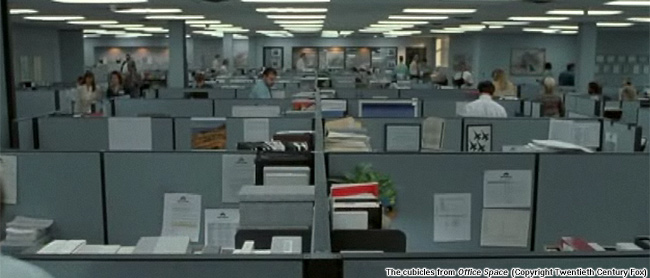There's this place called Xerox PARC. At the dawn of the Computer Age they invented personal computers, and Ethernet, and Smalltalk, and windows and stuff. And the conference rooms were full of beanbag chairs and the streets were paved with gold. This is what your professors think the real world looks like.
 |
| Xerox PARC, ca. 1980: A fantasy of the real world |
This is the "real world" you hear about in college. It's a world where nerds rule and employers are so desparate for top talent that they'll do anything to keep you happy.
It's a fantasy; a fairy tale told by people (students) who have never even seen the real world, and people (professors) who turned their backs on the real world in favor of a place where you could never ever ever be fired no matter how you behaved, once you got tenure.
Mostly, the real world looks like this.
 |
| Sorry, this is a lot more real |
Employers really are desparate for top talent. Only the thing is, new grads aren't top talent, no matter how smart you are. You're a n00b, a novice. You won't even know how much you don't know for a couple of years. To employers, top talent means that one guy on the team who turns out 10 times as many lines of solid, functioning code as anyone else; who works 80 hour weeks for 40 hours of pay; who's been coding since he built his first computer from individual logic gates when he was six. Top talent has already worked for Microsoft and Google and Facebook. That's how your employer knows they're top talent. You haven't worked for anyone at all.
There are indeed startups with free food, and wine, and foosball, and a fancy office. They just aren't all the same startup. And most of them are in just one or two cities; cities where a decent house costs a million bucks; cities you don't currently live in. What every startup has is long hours and low wages and stock options, which 99 times out of 100 expire worthless, and 1 percent of the time make you a millionaire. Most startups only live for a year. Then they crash and take your dreams of wealth with them, leaving you unemployed, wondering why you worked so hard for so little.
In the real world, if you're lucky, you either play nice with others, or find yourself suddenly unemployed. If you aren't so lucky, your employer doesn't care if you smell like sweat socks and annoy your colleagues with conspiracy theories, because basically they don't even care if you are a carbon-based life form, as long as you crank out code.This type of employer treats you like a replaceable part, and discards you like last years' cell phone when they're done with you.
In the real world, your CEO is probably not a geek. He's probably an extraverted, glad-handing, back-slapping, ex-frat-rat, because weirdly enough that's the right skill set for a CEO. He definitely votes Republican. And he thinks you look a lot like the nerdy kids he used to stuff into lockers and trip in the cafeteria.
Working in the real world is a job. It can be a lot of fun, but it's also a lot of work, and a certain amount of tedium, and a certain amount of putting up with stuff you don't like. There are 2,000 Mondays in the average career. Anyone who tells you different doesn't know what he's talking about.
No comments:
Post a Comment